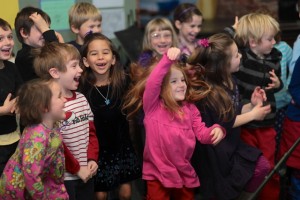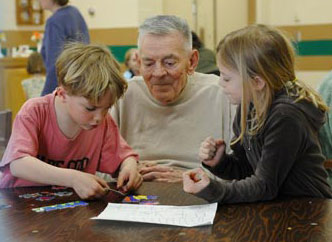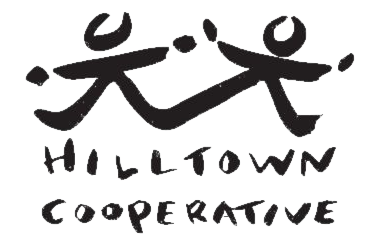 Hilltown is a dynamic community. Many elements come together to create Hilltown’s distinctive culture, our way of being, and more importantly, our way of doing. Various external and internal forces have changed and molded our vision and practices over time, some in predictable ways, some not, yet somehow Hilltown remains distinct.
Hilltown is a dynamic community. Many elements come together to create Hilltown’s distinctive culture, our way of being, and more importantly, our way of doing. Various external and internal forces have changed and molded our vision and practices over time, some in predictable ways, some not, yet somehow Hilltown remains distinct.
The students at Hilltown learn how to learn: how to question, how to research, how to analyze, how to be successful working alone and as a team. We believe critical thinking, independent judgment, and problem solving strategies are central to our students’ future success. Multi-age education, a student centered, project-based curriculum approach, and integration of the expressive arts in the classroom are all important to our success.
 Curriculum at HCCPS contains both open-ended and established components. We work to help children develop their basic skills in reading, writing, and mathematics. Often, this instruction occurs in the context of teaching a larger theme or concept. Other times, skills are taught directly, and practiced regularly through a variety of curricular projects. We used some published materials in the reading, writing, mathematics and spelling. These are supplemented by a variety of teacher generated materials. We look at students as individuals, and work to meet their needs through a variety of instructional strategies. Topics from the Massachusetts Curriculum Frameworks are used to identify themes of study and determine content areas. The Common Core provides a framework for identifying skills students need to develop as they move through the grades.
Curriculum at HCCPS contains both open-ended and established components. We work to help children develop their basic skills in reading, writing, and mathematics. Often, this instruction occurs in the context of teaching a larger theme or concept. Other times, skills are taught directly, and practiced regularly through a variety of curricular projects. We used some published materials in the reading, writing, mathematics and spelling. These are supplemented by a variety of teacher generated materials. We look at students as individuals, and work to meet their needs through a variety of instructional strategies. Topics from the Massachusetts Curriculum Frameworks are used to identify themes of study and determine content areas. The Common Core provides a framework for identifying skills students need to develop as they move through the grades.
At the same time, we value giving students the opportunity to steer the direction of the curriculum in any given year. Based on a given topic, teachers pose initial, open-ended questions. Explorations (research, study, experiments, and other activities that come out of this inquiry) happen next. These explorations naturally leads to more opportunities for active questioning. The result is active learning which is at the core of our educational philosophy.
Hilltown Cooperative Charter Public School works to ensure that students with disabilities receive appropriate special education services. Both federal and state law requires that admission to a charter school be conducted without regard to or consideration of whether the child has a disability, and so charter schools are open to all students, whether or not they are eligible to receive special education services. Charter schools must provide special education services, up to the limits specified under the state charter school law, to all eligible students.
HCCPS ensures that students with disabilities receive the special education services to which they are entitled. The services may consist of special education instruction and related services in the least restrictive environment, or consist only of related services needed to access the general education curriculum. The amount and location of services (where services will be delivered) is determined by the student’s IEP team and is documented in the student’s IEP.
HCCPS provides a free appropriate public education to qualified students with disabilities under Section 504 of the Rehabilitation Act of 1973, as amended. Such education consists of general education accommodations and related aids and services designed to meet the individual educational needs of students with disabilities as adequately as the needs of students without disabilities are met. An appropriate education for a student with a disability under Section 504 regulations could consist of education in general education classrooms with accommodations, education in general education classes with supplementary services, and/or related services. Schools would include these services in a “504 Plan.”
English Learners receive language support and other services at HCCPS. As defined in state law, an English learner is a student who does not speak English, or whose native language is not English, and who is not able to do ordinary classroom work in English. This includes students who, without language support services, would have trouble understanding lessons in school, or completing work in school because they are still learning English. Hilltown provides direct instruction to help ELs learn the English language, and subject matter instruction (for example, science or history) that is presented in English using strategies that help the student better understand the content. Full and equal access to the programs and services offered at the school is made available to ELs.
Atelier
The Atelier is a place for exploration of materials and ideas. We further develop concepts connected to academic curriculum as well as skills and techniques inherent to the art making process. We learn visual art vocabulary, further critical thinking, and problem solving in a variety of art mediums.
Music
 Singing is the backbone of the music program at Hilltown and familiar songs create a shared language within our community. Students begin learning the repertoire when they enter the school in kindergarten and the whole school sings together weekly at All-School Meeting. Music classes often involve learning songs or dances that specifically connect to the students’ social studies, language arts, or science curriculum in addition to community and seasonal songs.
Singing is the backbone of the music program at Hilltown and familiar songs create a shared language within our community. Students begin learning the repertoire when they enter the school in kindergarten and the whole school sings together weekly at All-School Meeting. Music classes often involve learning songs or dances that specifically connect to the students’ social studies, language arts, or science curriculum in addition to community and seasonal songs.
- K-6 classes meet twice a week for music and movement. Lessons are centered around active music-making and skills development.
- K/1 students build a strong foundation for music-making, focusing on developing a steady beat, accurate singing voice, and cooperative skills through songs, games, dances, and playing simple instruments.
- 2/3 students continue to strengthen their singing and rhythmic skills, and are introduced to literacy (reading and writing notation). The Orff instrumentarium (barred percussion) are used to accompany songs and practice skills.
- 4/5 students learn soprano recorder and soprano ukulele, as well as more complex percussion pieces.
6th graders learn alto recorder and baritone ukulele, applying their knowledge to songwriting. - K-3 classes develop kinesthetic and expressive skills through creative movement, and all classes build community through age-appropriate folk dances.
- 7/8 music classes meet once a week and lessons balance singing and playing instruments with listening, analysis and integration with other subject areas.
At Hilltown, we strive to offer students rich and varied musical experiences and performance opportunities. The Hilltown Chorus for grades 3 through 5 (open to 2nd graders in the spring) performs a varied repertoire of traditional choral music, folk songs, musical theater, and American classics. Singers in 6th through 8th graders are invited to join Hilltown Harmonies. The Chamber Ensemble is open to intermediate and advanced instrumentalists. Other extracurricular activities (Percussion Ensemble, Rock Band, Morris Team), may vary depending on student interest and enrollment. All students perform at the Winter Fair in December and at the Community Music Festival in May.
 In addition to the regular music program, Hilltown students also have the option (at parent expense) of studying a string instrument (violin, cello or bass) and playing in the school “orchestra” or studying guitar or bass through group lessons scheduled during the school day.
In addition to the regular music program, Hilltown students also have the option (at parent expense) of studying a string instrument (violin, cello or bass) and playing in the school “orchestra” or studying guitar or bass through group lessons scheduled during the school day.
Movement classes meet once a week for our K-6 students and include Folk Dancing for everyone with an emphasis on Creative Movement for K-3rd graders.
Beyond academic curriculum, children learn essential life skills through participation in an intimate, whole school cooperative. Involvement in the local environment and its communities inspires learning and encourages social and civic responsibility as well as stewardship for the earth.
cooperative. Involvement in the local environment and its communities inspires learning and encourages social and civic responsibility as well as stewardship for the earth.
Download this published guide describing an intergenerational model of community service learning used at Hilltown: Bridging the Gaps –
Interdisciplinary study is a key element of the Hilltown Mission. Teachers plan units of study which foster connections between traditional disciplines, and allow students multiple ways of learning skills and concepts.

